|
|
|
Sort Order |
|
|
|
Items / Page
|
|
|
|
|
|
|
| Srl | Item |
| 1 |
ID:
131483
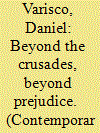

|
|
|
|
|
| Publication |
2014.
|
| Summary/Abstract |
As the Moroccan American scholar Anouar Majid reminds us on the first page of his latest book, Islam and America: Building a Future without Prejudice, we are drowning in information about the relationships of Muslims and the West but are not yet being rescued by this expanding corpus. This and his earlier We are All Moors come as close to any books I have read recently that hold out promise for such a rescue, at least in the forward-thinking rhetoric that outlasts the general effluvium of political punditry. Majid, who came to the United States in 1983, is currently director of the Center for Global Humanities at the University of New England in Portland, Maine. His training in literature has well prepared him to probe novels, poems, travel accounts and political manifestos for past reflections on how Islam has been perceived since the founding of the United States. His grasp of American history and a
wide range of historical sources consulted is a welcome contribution to a field where partisan political books stock major bookstores and reflective academic studies are read almost exclusively by a small circle of fellow academics. Both of these books deserve a wider readership that I fear they will not receive in the flood of punditry on Islam vs. the West
|
|
|
|
|
|
|
|
|
|
|
|
|
|
|
|
| 2 |
ID:
169030
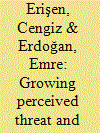

|
|
|
|
|
| Summary/Abstract |
Tolerance is a central concept for a society’s democratic foundations. Many forms of populism threaten tolerance and are a growing concern for consolidated liberal democracies as well developing ones. Right-wing ideology, heightened nationalism, and xenophobic rhetoric toward minorities are threatening social cohesion, public unity, and liberal values. Turkey, subject to various destabilizing recent events, faces specific challenges amid political, social, and economic uncertainties. Using two waves of a nationally representative survey, conducted after each of two general elections in 2015, we studied changes in the behavioral indicators of intolerance in the Turkish electorate. We found that perceived threat and prejudice explain changes in public intolerance during this period. We discuss the implications of our results for the standing of democracy in Turkey.
|
|
|
|
|
|
|
|
|
|
|
|
|
|
|
|
| 3 |
ID:
190934
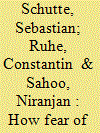

|
|
|
|
|
| Summary/Abstract |
Earlier research on ethnic and religious conflict has identified fear as an important motivation. While theoretically sound, this expectation has never been tested at larger scales in ongoing episodes of political violence. Instead, conceptual progress has been made in lab experiments. Combining insights from observational research and stylized experiments, we predict that fear for personal safety due to witnessed violence causes prejudice against out-groups, enhanced internal cohesion, and support for extremist actors. To test these predictions, we conducted surveys in the Indian State of Uttar Pradesh with identical respondents in three waves starting in January 2017. The surveys continued during the tense Legislative Assembly elections in the Spring. The results largely corroborate the theoretical expectations and present a hard in-vivo test of long-standing conjectures.
|
|
|
|
|
|
|
|
|
|
|
|
|
|
|
|
| 4 |
ID:
192903
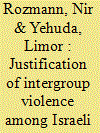

|
|
|
|
|
| Summary/Abstract |
This article investigated whether perceived threat is related to justifying intergroup violence based on integrated threat theory. Israeli-Jewish participants (n = 236) answered questions on perceived Israeli-Arab threat, frustration leading to aggression, and intergroup violence justification. The findings indicate that there is a significant correlation between perceived realistic threat and intergroup violence justification, whereas no significant correlation was found between frustration leading to aggression and intergroup violence justification. These results suggest the need to better understand intergroup conflicts in the field of international relations.
|
|
|
|
|
|
|
|
|
|
|
|
|
|
|
|
| 5 |
ID:
144280
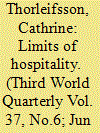

|
|
|
|
|
| Summary/Abstract |
Based on qualitative fieldwork in the Sunni village of Bebnine, located between Tripoli and the northern Syrian border, this paper explores how displaced Syrians adjust to life in Lebanon under the threat and actuality of violence. The marginalised refugees do not only appear as passive victims of crisis but draw on a diverse repertoire of coping strategies to deal with displacement and dispossession. Self-settled Syrians have exploited social networks, savings, aid, education and work opportunities to create a new livelihood system for themselves. Nevertheless, everyday life in Lebanon is not conceptualised as a safe zone. Syrian refugees are increasingly being used as scapegoats for the poor economy and political challenges in the country. While practices of hospitality towards the Syrian refugees were widespread, ambivalent feelings and prejudice frequently surfaced. Refugees expressed concern that the Syrian civil war would escalate into further sectarian violence in Lebanon, pushing the country closer to war.
|
|
|
|
|
|
|
|
|
|
|
|
|
|
|
|
| 6 |
ID:
089010
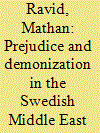

|
|
|
| 7 |
ID:
188082
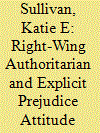

|
|
|
|
|
| Summary/Abstract |
When a terror attack occurs people appear to be prepared, in the short term, to be more accepting of authoritarian sanctions against outgroup members, particularly if sanctions are targeted against members of the outgroup perceived as responsible for the attack. The current study examined forty-two British participants’ scores on measures of right-wing authoritarianism (RWA) and explicit prejudice (EP) before, within thirty-six hours of, and one year after the November 2015 Paris terror attacks. As higher scores on RWA measures have been linked to considering the world as dangerous and threatening, and desiring that authority control and punish transgressors of societal norms, and higher EP scores have been linked to negative perceptions of outgroups, we hypothesized that participants’ scores on both measures would increase immediately after the terror attack. Analyses showed small but significant increases in RWA and EP scores immediately after the attacks, particularly for those initially scoring lower on these measures, but scores on both measures had returned to baseline levels oneyear later. These findings from a within-subjects sample support recent between-subjects research suggesting that RWA and EP attitudes are impacted in the short term by reported terrorist attacks.
|
|
|
|
|
|
|
|
|
|
|
|
|
|
|
|
|
|
|
|
|